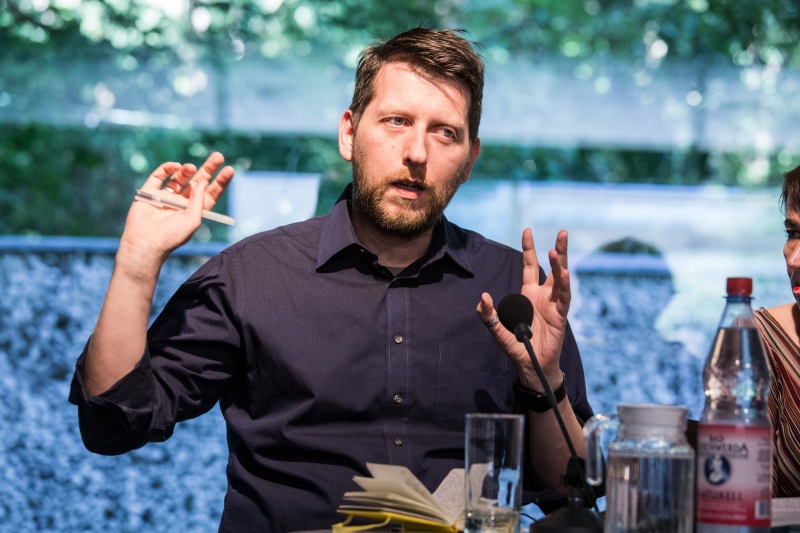Question and Answer: Theodoros Chiotis
Question by Adriana X. Jacobs

Theodoros Chiotis is the editor and translator of the anthology Futures: Poetry of the Greek Crisis (Penned in the Margins, 2015). Other publications include Screen (in collaboration with photographer Nikolas Ventourakis; Paper Tigers Books, 2017) and limit.less: towards an assembly of the sick (Litmus, 2017). His work has appeared in Catechism, Litmus, Datableed, Forward Book of Poetry 2017, Adventures in Form, Austerity Measures, Shearsman, aglimpseof, Visual Verse, lyrikline, Otoliths, amongst others. He has translated contemporary British and American poets into Greek and Aristophanes into English. He is a member of the editorial board of the Greek literary magazine [φρμκ] and contributing editor for Hotel magazine. His project Mutualised Archives, an ongoing performative interdisciplinary work, received the Dot Award by the Institute for the Future of Book and Bournemouth University; he has also been awarded a High Commendation from the Forward Prizes for Poetry in 2017. He tweets @selfcoding.
Adriana X. Jacobs: You’ve edited an anthology on poetry of the Greek financial crisis and participated in conferences and symposia that address more generally the relation between poetry and crisis. Given that each crisis has its own particular history and cultural context, how may crises be compared?
Theodoros Chiotis: I would be quite wary of attempting to conflate or compare crises. The emotional load that comes along with the experience and impact of any given crisis needs to be weighed against our cognitive experience of a crisis. Inherent in the term “crisis” is the need for some sort of resolution or some sort of interpretation; however, crisis should be conceived more as the limit of a consistently mutating Real, subject to the processes of capitalism. Indeed, we need to consider the framing and reframing of the redistribution of monetary, cognitive and cultural capital in the context of a virus-like crisis that changes constantly and breaks out in both far and neighbouring geographic locations. In my view, the only thing that all these crises have in common is that they are powered, so to speak, by non-human processes and random events whose velocity and contingency often overtake the human capacity for a considered and premeditated reaction. I do not think it is sheer luck that phrases such as “crisis management” have entered the vernacular and are in use in non-military contexts, like public relations (but then again, one can confidently argue that PR in the day and age of social media can account to something akin to the art of war).
In fact, I feel it is important to pay attention to the discourse emerging from narratives of crisis and especially the language used by the subjects living in these narratives. The standardisation of certain terms has intervened on the way one views reality and the ways one experiences reality. According to the Merriam-Webster dictionary, the first known use of “crisis” in the English language is in the 15th c.; it comes from the Middle English crise, crisis, borrowed from Latin crisis “judgment, critical stage,” borrowed from Greek krísis “act of separating, decision, judgment, event, outcome, turning point, sudden change,” from kri-, variant stem of krī́nein “to separate, choose, decide, judge” + -sis, suffix forming nouns of action or process. Crisis for native Greek speakers, even for lapsed Greek Orthodox speakers like myself, also carries the loaded connotation of judgment in the Biblical sense. In Acts 17:31 in the New Testament, we read ἔστησεν ἡμέραν ἐν ᾗ μέλλει κρίνειν τὴν οἰκουμένην, “he established a day during which he will judge all of creation.” Crisis is inextricably entwined with the seemingly impersonal passing of judgment; the inevitable separation of wheat from the chaff, the definition of which is dependent on the uneven distribution of wealth, results in the attendant production of dolorous subjects and subjectivities-in-crisis. I feel that it is imperative in this instance to approach all these different contemporaneous crises without succumbing to the temptation to trace said crisis solely within specific agents and specific geographical sites. One does not live through a crisis; a crisis is lived. All of these crises are symptomatic of something and the discourse (literary or otherwise) generated during these times must be examined as the partial enunciation of a subject-in-formation.
 Adriana X. Jacobs is Associate Professor of Modern Hebrew Literature in the Faculty of Oriental Studies and Fellow of the Oxford Centre for Hebrew and Jewish Studies. She has published widely on contemporary Hebrew and Israeli poetry and translation, including articles in Shofar, PMLA, Studies in American Jewish Literature, and Prooftexts. Her translations of Hebrew poetry have appeared in Gulf Coast, Anomaly, World Literature Today, North American Review, The Ilanot Review, among others, as well as in the collection Women’s Hebrew Poetry on American Shores: Poems by Anne Kleiman and Annabelle Farmelant (Wayne State UP, 2016). Her book Strange Cocktail: Translation and the Making of Modern Hebrew Poetry came out last year with University of Michigan Press. She is a 2015 PEN/Heim Translation Fund grant recipient for her translation of Vaan Nguyen’s The Truffle Eye and tweets @ladymacabea.
Adriana X. Jacobs is Associate Professor of Modern Hebrew Literature in the Faculty of Oriental Studies and Fellow of the Oxford Centre for Hebrew and Jewish Studies. She has published widely on contemporary Hebrew and Israeli poetry and translation, including articles in Shofar, PMLA, Studies in American Jewish Literature, and Prooftexts. Her translations of Hebrew poetry have appeared in Gulf Coast, Anomaly, World Literature Today, North American Review, The Ilanot Review, among others, as well as in the collection Women’s Hebrew Poetry on American Shores: Poems by Anne Kleiman and Annabelle Farmelant (Wayne State UP, 2016). Her book Strange Cocktail: Translation and the Making of Modern Hebrew Poetry came out last year with University of Michigan Press. She is a 2015 PEN/Heim Translation Fund grant recipient for her translation of Vaan Nguyen’s The Truffle Eye and tweets @ladymacabea.
